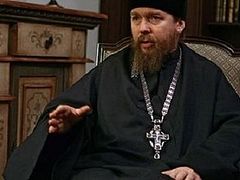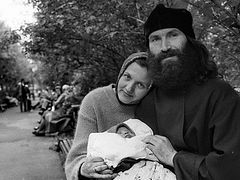Marriage is very serious. It’s not just concluded—it finds its foundation in the Church, which is a place of communion between people, their real unanimity, and the main thing is that in it we receive the grace of God for strengthening ourselves. The Mystery of Marriage, as any other Sacrament, is celebrated in Church—not some formal action, but a real Sacrament, and the words pronounced there are real and essential; they are reality itself.
When someone is ordained as a priest, we don’t tell him, “We hope you become a priest! Although, perhaps you won’t become one!”—no, he necessarily becomes a priest. When we say, “The servant of God is baptized,” the child becomes a Christian, and that means that this person is already baptized—he is a Christian. Demonic energy flees from his heart and his entire being, he throws off the old man and clothes himself in Christ, Divine grace covers his heart, and he becomes one whole with Christ.
It is the same when we get married—it means we are receiving the grace of the Holy Spirit, uniting two people. That is, people begin to possess something that is activated—God gives it to them through the Church, and it is activated, that the Sacrament might act, strengthen, and protect people, and give them strength.
I remember at New Skete on Mt. Athos, where we lived, three or four Jews visited us once. One of them felt something special. When we started asking him about it, he spoke about himself—he was twenty-seven and in infancy he had been an Orthodox Christian. What happened then? His mother was a Cypriot who married a Jew, and when the child was born, they baptized him, but, when he turned two, she left her husband, leaving him with the child. That is, he practically never saw his mother but he knew that he was the son of a Christian and was baptized, but otherwise he was an ordinary Jew: He went to synagogue, didn’t believe in Christ, and didn’t know Greek. However, inasmuch as he was baptized, there was grace upon him.
It is somewhat reminiscent of professional secrets. That is, just as a skilled policeman can understand when one person is not a criminal, but another is a liar and a thief—it is obvious to him—that’s how the monks understood something, and in his case it was obvious. That is, the grace of God, the grace of the Holy Spirit is something that exists and changes a man—it is undoubted and proven. People associated with the Church have a different emanation, in which there is no falseness. If someone wants to pretend to be religious, it will be some kind of spectacle: It’s impossible to portray this, because you immediately cease being natural; because grace truly exists, and it is something completely different—that is, it is a truly existing reality, a connection, a real presence—something that is truly given to man.
A priest celebrating the Sacrament blesses with a cross the crowns and the newlyweds themselves, in order to show that their connection is founded primarily on the grace and blessing of God, and secondly, it has a cross-like character. We get married not for the sake of sensuality or pleasure. Well, all right, you’re going to get married, and you will find the person who will attract you from every angle, even bodily, and it’s not bad. That is, you can’t get married to a girl whom you’re not attracted to, including bodily, and that shouldn’t shock you, because the connection in marriage embraces everything.
It sounds paradoxical and strange, but there needs to be an attraction. Of course, if there is only a carnal attraction, then the marriage is doomed to failure, because it stands on an improper foundation. That is, it cannot develop in time and hold out, because there might be bodily unity there, but no spiritual unity with the other person. If you don’t spiritually communicate with the other, then the rest doesn’t matter. A bodily connection is nothing special, and it doesn’t help people. I have said elsewhere that if it helped, it would be happiness if bodily unity helped people find a spiritual unity—people would then be delivered from so many torments, spouses would be loving, happy, cohesive, and they wouldn’t separate at all; but, unfortunately, it is obvious that things are different.
The marriage bond is a cross-like connection, a connection founded on God’s blessing, which presupposes that the couple are entering into it consciously, with a readiness to transcend themselves and overcome their egos in order to communicate with one another. They must consecrate themselves and this very connection and the other person; they must empty themselves, give themselves into the hands of the other person, and not become masters over them. As they sometimes say, “You’ll be mine anyways!” But from God’s point of view it’s reminiscent of the wars of Artaxerxes, eager to take over Greece.
It’s enough just to hear these words and we are horrified. What does it mean—you master me? What, are you going to destroy me? But God does not say that He is going to conquer us. He gave us life. He has given Himself to us as food—He has given us His Body and Blood, that we might eat and drink them, that we might receive Him into ourselves and be alive. That is love—giving yourself to another that he might live by you, as Christ did: I am come that they might have life, and that they might have it more abundantly (Jn. 10:10). I came into the world to give Myself to you as food and drink, that you might live, and not just live, but have life in abundance—that you might abound with life.”
That is love. That is the Cross of Christ, it is a cross-connection that a person has with another when he realizes what ground he has stood upon in order to build this connection. Then one can feel that his life moves along a sacred path: The other is sanctified, the body of the other is sanctified, and their connection is not something accidental.
There was a biomedical ethics conference in Limassol where there was a distinguished lecturer who spoke about this precisely, saying a doctor should look at others as something sacred, including their body and condition. You mustn’t approach the patient and tear his sheets off of him while he’s lying under them naked and there’s fifty students or trainees standing all around. A doctor should learn to respect a patient, and when he has to examine someone, he should expose only the part of the body that he must examine, and not strip him entirely down to what he was wearing when his mother gave birth to him. He’s shy! Would the doctor like it if they did that to him? Let’s put him on the bed and look and see if he’ll like it if we call five or six of his neighbors over. That is, even if you’re a doctor, you have to have a sense of the sacredness of man.
I would like to tell you something about burial practices. When a priest dies (and laity too, but I am speaking now about priests), when the body of the priest is clothed and prepared for burial, only priests should do it—no one else is allowed to do it. It’s the same with monastics. The Euchologion1 says it’s impermissible to look at the naked body of a monk.
When it’s time to change his clothes, it must be done with all reverence, as is described in the following manner, and not to disrobe him completely. It’s not because a naked body is bad—no, it’s not bad—God created us that way, but our passions are evil; the body is not evil, and we have no bodily members that would be sinful, but rather they are sacred. All the members of the body are holy; the entire person is baptized, we receive the Body and Blood of Christ and the whole man is sanctified. The Lord died on the Cross for the whole world, to reveal His complete humility; He endured everything for us, and was not ashamed to hang naked on the Cross, dying for the world.
A man can behave this way in relation to himself, but not in relation to others. Even if you are a doctor, even if it’s a corpse, a dead man lying before you, you cannot relate to the body of another irreverently.
It’s exactly the same when a priest dies and they clothe him in priestly vestments, and we monks also keep the clothes in which we gave our vow to Christ, our schema, that we will remain faithful to Christ’s love unto death. We preserve them for the hour of our death. We prepare ourselves, and our burial clothes are already prepared.
And do you, my children, remember that our grandmothers also kept them? Did you ever see such grandmas? What did they hold onto? Do you remember what the kept? Their wedding dresses. Not the white ones, but what they wore on the second day, since weddings continued for many days then. In those times, it didn’t all end with you receiving envelopes with money, and then the next day the newlyweds beginning to suffer because the parents sit down to count the money and to see who gave how much.
We had a divorce recently, and the reason for it is that that the day after the wedding, when they began to count the money, the one side said, “Our friends gave more money!”
“No, our friends gave more,” the other side answered.
Thus began strife, and within a week, the marriage had fallen apart.
People would save the wedding clothes they wore on the second day of the wedding, and they would lie in it in the grave, and they also took their wedding crowns with them. That is, the ones they were crowned with, they took with them in order to show their fidelity, sacredness, and serious attitude that they had towards marriage: It was absolutely sacred for them.
I remember now, and it’s as if I see my grandmother before me. When she was already an old woman, she opened a big bureau that she blessed with the Sign of the Cross before she opened it—she didn’t just open it. All of the valuables she had kept were there, and the bureau smelled sweet from them. She pulled out a blue dress and said, “This is the dress you’ll dress me in when I die!”
She had taken care of it. She put it on again to see whether it fit, whether it needed to be adjusted somewhere, so people wouldn’t have to suffer with it in her last hour; she called the seamstress so she could look at it as well, and so that everything would be ready—the crowns, everything. What a good attitude, my children, how human!
When everything is built on God’s blessing, then you will have a healthy disposition and attitude towards what you do and what you say to others. I think this is the correct attitude towards the Sacrament of Marriage and it is the best thing a person can do for his marriage to be strong. Conversations with our parents are also useful, as well as with psychologists—that is, with those people who teach us to communicate with each other: what the other should say to you, and how you should answer him, and what we should talk about with one another. Unfortunately, it is now necessary for us, and how tragic that we are forced to turn to specialists, to learn to talk with our own wives and husbands, that we should know what to say and how to answer, and when to return home. And we pay 500 lira2 for a six-month “course,” as we now call it.
So, a six-month course to learn how to communicate. That’s modern man. He can communicate online, through email, and he can go anywhere he wants and learn whatever he wants, but to communicate with his wife and children—that he cannot do. First learn how to communicate with your wife, and then speak on the internet! Learn ahead of time, my son, how to communicate with your wife, with your children. Learn this simple task, this human communication—the simplest thing, and then speak with others. This is not forbidden, but what a pity that in this we do not understand that we have lost someone. In this commotion in which we live, we have lost someone, and lost the simplest human abilities.
Of course, if a parent leaves in the morning and returns at night, when the child is already sleeping, he has lost his child. When will you see your child, when will you feel this childlike presence, when will you watch him grow from the moment of his birth, if you leave at seven in the morning and return at eight at night, when the child is already sleeping? Or he waits for you in the chair, to look at you and then go to bed. And in the morning it’s the same thing.
So you have lost this opportunity. But why? Because you have to work and earn money. Money is a good thing, but when you have money, two cars, stocks, you’re going to lose your children. And you’ll understand that you lost the most important thing. It would be better if you didn’t have everything, but only those serious and important things, that make up not just anything, but human life. I’m not even talking about spiritual things, about what kind of connection unfolds between man and God, but we should at least become human, not to mention everything else.
Unfortunately, savagery is no longer a feature of wild tribes living in jungles, if such still remain. It’s a symptom of our society. And it’s tragic, my children. The most tragic thing is to the see spouses who cannot speak to one another. Unfortunately, I often encounter this when people come with their spouses with such problems.
I tell them: “Come on, my children, it’s simple—just talk!”
And they have nothing to answer. And an explosion happens from any tiniest thing.
It’s a painful situation where the end is unseen, that is, what needs to be healed. You stand, you watch them and you don’t know where to put the bandage, what to heal, and in general what to do.
All of this is the fruit of our mentality, and we pay for it. Unfortunately, that’s how we are taught, and the Church is also to blame—it also bears responsibility, inasmuch as it has not properly told people about its truth, but has limited them to information. We are guilty because we have lost our essence.





